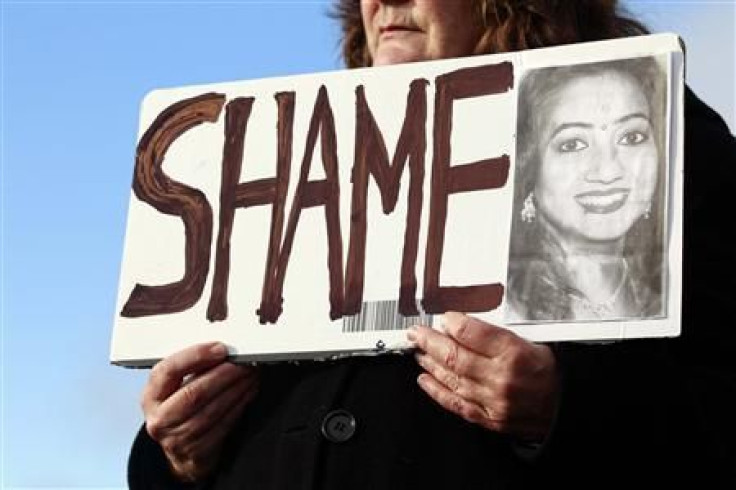Savita Halappanavar, Indian Woman Who Died After Being Denied Abortion In Ireland, Sparks Outrage [PHOTO]

The death of Savita Halappanavar, an Indian national who was denied an abortion of her pregnancy while she miscarried in Ireland, has sparked debate about legalizing abortion in the predominantly Catholic nation as well as outrage over the 31-year-old woman’s death.
Halappanavar, who was 17 weeks pregnant, died of blood poisoning after she was found to have been miscarrying her baby late last month. Doctors at University Hospital in Galway discovered her condition after she went to the hospital complaining of back pain and requested that her pregnancy be aborted.
The country’s constitution forbids abortions, but Ireland’s Supreme Court ruled in 1992 that urged the practice be legalized when the mother’s life is at risk. The Irish government has not enacted laws that follows the Supreme Court’s advice, the Associated Press noted.
"In an attempt to save a 4-month-old fetus they killed my 30-year-old daughter. How is that fair you tell me?" Halappanavar’s mother, A. Mahadevi, told various Indian news outlets, according to the AP. "How many more cases will there be? The rules should be changed as per the requirement of Hindus. We are Hindus, not Christians.”
Savita's case has spurred the Irish government to promist to move quickly on amending its abortion laws, Reuters reported.
"I don't think as a country we should allow a situation where women's rights are put at risk in this way," Irish Deputy Prime Minister Eamon Gilmore told parliament on Thursday. "There is no question of equivocation. We need to bring legal clarity to this issue and that is what we are going to do."
Halappanavar’s death has spurred two investigations, one by the Irish Health Executive Service into the Galways hospital and University Hospital is conducted its own internal investigation, the Irish Times reported.
The Indian national’s husband, 34-year-old Praveen Halappanavar, an engineer at Boston Scientific in Galway, described his wife’s condition shortly before she died and how the hospital said its hands were tied on performing an abortion.
“Savita was really in agony. She was very upset, but she accepted she was losing the baby,” Praveeen Halappanavar told the Irish Times. ”When the consultant came on the ward rounds on Monday morning Savita asked if they could not save the baby could they induce to end the pregnancy. The consultant said, ‘As long as there is a foetal heartbeat we can’t do anything.’”
Vigils and protests were held Wednesday night in Savita Halappanavar’s honor in Ireland by Pro-Choice Campaign Ireland, a group looking to overturn the country’s abortion policy.
"Tonight is about solidarity. Tonight is about showing Savita's family that we are sorry for what has happened to her and we are sorry for the terrible tragedy that has happened,” said Choice Ireland spokeswoman Sinead Ahern, according to the Irish Times. “Today marks the day that there is no more stigma and no more shame."
© Copyright IBTimes 2024. All rights reserved.












